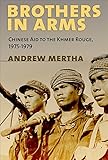Brothers in arms : Chinese aid to the Khmer Rouge, 1975-1979 / Andrew Mertha.
Material type: TextPublisher: Ithaca, New York : Cornell University Press, 2014Copyright date: ©2014Description: 1 online resourceContent type:
TextPublisher: Ithaca, New York : Cornell University Press, 2014Copyright date: ©2014Description: 1 online resourceContent type: - text
- computer
- online resource
- 9780801470738
- 0801470730
- 1501731238
- 9781501731235
- Rote Khmer
- China Zusammenstellung
- Technical assistance, Chinese -- Cambodia
- Military assistance, Chinese -- Cambodia
- Cambodia -- Foreign relations -- China
- China -- Foreign relations -- Cambodia
- Cambodia -- Politics and government -- 1975-1979
- Assistance technique chinoise -- Cambodge
- Assistance militaire chinoise -- Cambodge
- Chine -- Relations extérieures -- Cambodge
- Cambodge -- Politique et gouvernement -- 1975-1979
- BUSINESS & ECONOMICS -- Industries -- General
- HISTORY -- Asia -- Southeast Asia
- Diplomatic relations
- Military assistance, Chinese
- Politics and government
- Technical assistance, Chinese
- Cambodia
- China
- Cambodge
- Internationellt bistånd
- Utrikespolitik
- Röda khmererna
- 1975-1979
- 338.91/51059609047 23
- DS554.58.C65 M47 2014eb
| Item type | Home library | Collection | Call number | Materials specified | Status | Date due | Barcode | |
|---|---|---|---|---|---|---|---|---|
 Electronic-Books
Electronic-Books
|
OPJGU Sonepat- Campus | E-Books EBSCO | Available |
Includes bibliographical references and index.
Assessing China's relations with Democratic Kampuchea -- Parochial totalitarianism : the Khmer Rouge bureaucracy -- The bureaucratic structure of Chinese overseas assistance -- DK pushback and military institutional integrity -- The failure of the Kampong Som petroleum refinery project -- China's development of Democratic Kampuchean trade -- What is past is present.
Print version record.
When the Khmer Rouge came to power in Cambodia in 1975, they inherited a war-ravaged and internationally isolated country. Pol Pot's government espoused the rhetoric of self-reliance, but Democratic Kampuchea was utterly dependent on Chinese foreign aid and technical assistance to survive. Yet in a markedly asymmetrical relationship between a modernizing, nuclear power and a virtually premodern state, China was largely unable to use its power to influence Cambodian politics or policy. In Brothers in Arms, Andrew Mertha traces this surprising lack of influence to variations between the Chinese and Cambodian institutions that administered military aid, technology transfer, and international trade. Today, China's extensive engagement with the developing world suggests an inexorably rising China in the process of securing a degree of economic and political dominance that was unthinkable even a decade ago. Yet, China's experience with its first-ever client state suggests that the effectiveness of Chinese foreign aid, and influence that comes with it, is only as good as the institutions that manage the relationship. By focusing on the links between China and Democratic Kampuchea, Mertha peers into the "black box" of Chinese foreign aid to illustrate how domestic institutional fragmentation limits Beijing's ability to influence the countries that accept its assistance
In English.
eBooks on EBSCOhost EBSCO eBook Subscription Academic Collection - Worldwide
There are no comments on this title.

